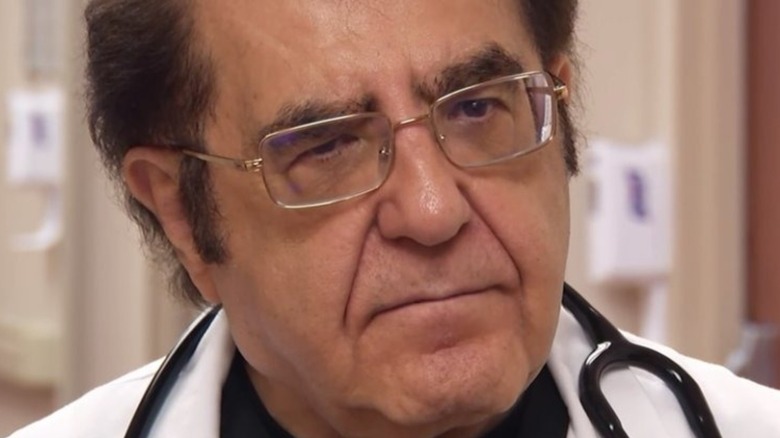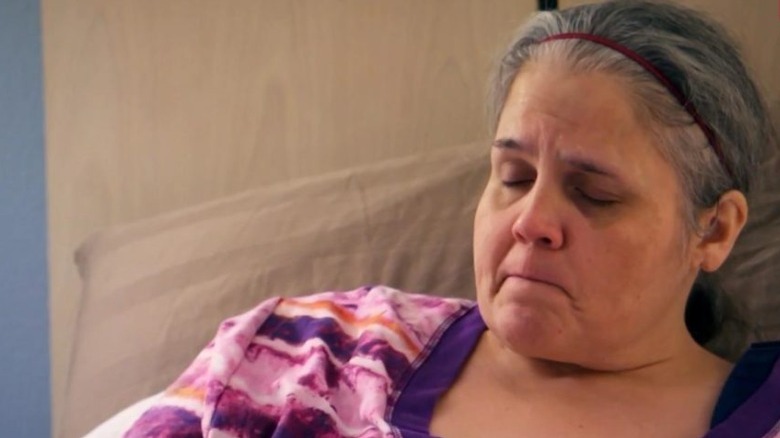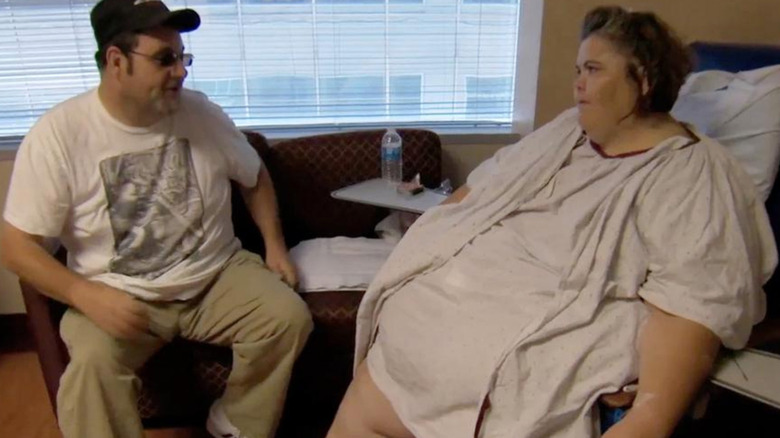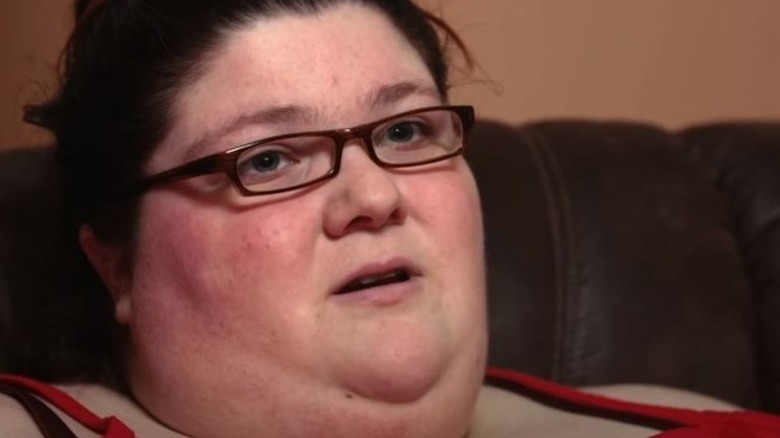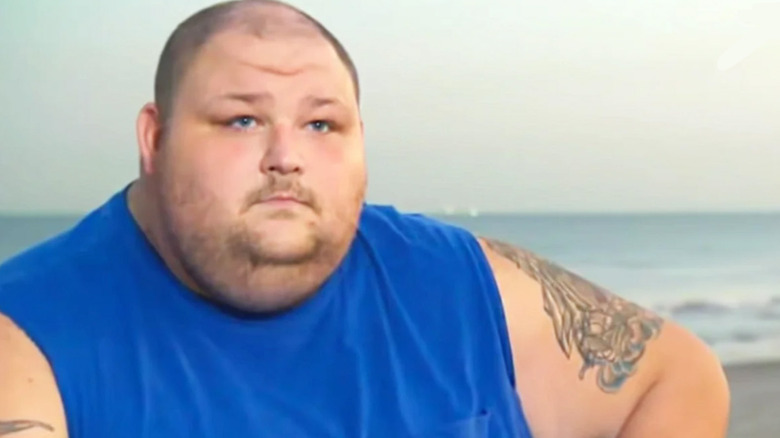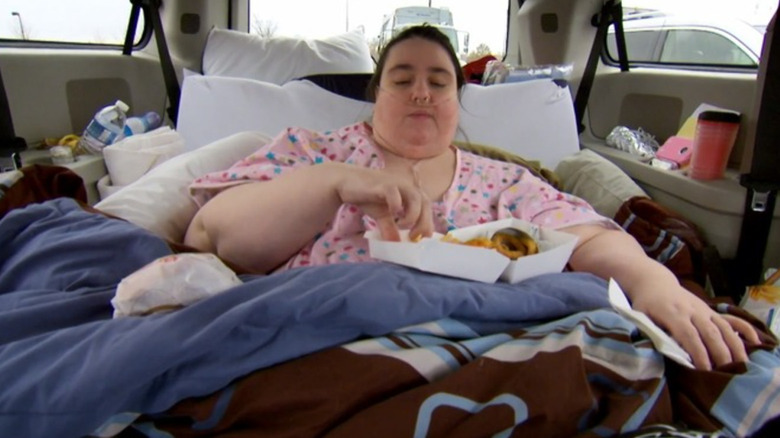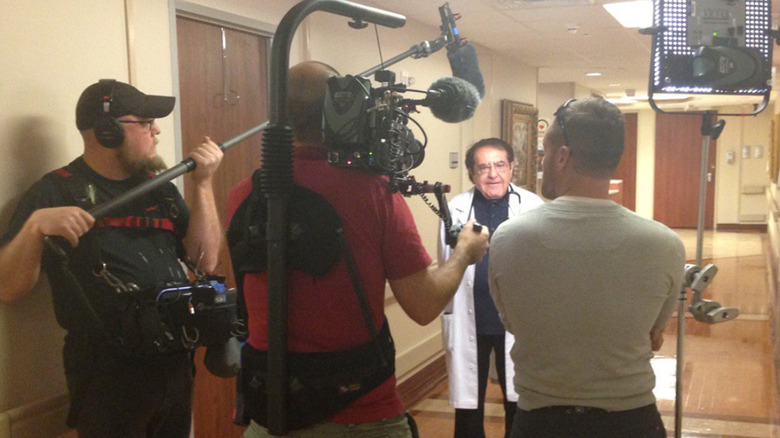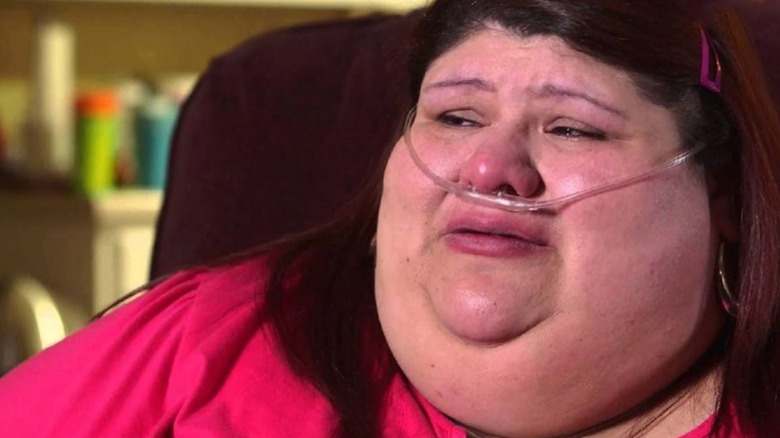The Shady Side Of My 600-Lb Life
"My 600-lb Life" documents the struggles of morbidly obese people attempting to regain control of their lives. Each episode follows one participant over a year as they prepare for weight loss surgery, recover from the aftermath, and begin their transformation. However, not everybody goes under the knife — as some are unable to follow the intensely restrictive diet that's required to lose enough weight for surgery to be performed.
All of the show's participants weigh 600 pounds or more. They've been written off as untreatable by previous doctors, as their size places them in the high-risk category for operations. "My 600-lb Life" is their final hope. The show's star medic, Dr. Nowzaradan (commonly referred to as Dr. Now), is one of the few professionals in the vascular and bariatric surgery world who is willing to treat such morbidly obese patients — and he is renowned for pulling no punches when it comes to telling it as it is.
The TLC series has caused controversy since it first aired in 2012. However, many seasons in, it still proves to be a smash hit for its network. According to TVShowsAce, 2021's season resulted in a ratings increase. So, despite multiple calls for its cancelation, it appears "My 600-lb Life" won't be disappearing anytime soon. Why does the show prove to be so controversial? Check out our rundown of the shady side of "My 600-lb Life" to find out why.
If you or someone you know is struggling with mental health, please contact the Crisis Text Line by texting HOME to 741741, call the National Alliance on Mental Illness helpline at 1-800-950-NAMI (6264), or visit the National Institute of Mental Health website.
The shower scenes are definitely not spontaneous
One of the biggest controversies surrounding "My 600-lb Life" is the shower scene that features near the beginning of each episode. The idea of appearing naked on television is a daunting and horrifying prospect, to say the least, for most people. However, the horror factor increases ten-fold when you're morbidly obese and constantly subjected to public ridicule, bullying, and judgment because of your weight.
As per In Touch, the intent is to provide "an unedited view of what it's like to wake up, take a shower, and get dressed" when you're somebody trapped inside of a 600 pound-plus body. There's no getting away from the fact that it makes for uncomfortable viewing. Some participants are incapable of fitting into their bathroom due to their size and are forced to rely on others washing them in bed — or, in some cases, being hosed down in an outdoor trough.
Producers allegedly insist that the shower scenes are a prerequisite to appearing on the show. One of the participants filmed during a back porch hose-down, Nicole Lewis, admitted she was so desperate to undergo surgery that she felt she had to acquiesce. "I know I needed help, and my main focus was to do this for my children," she told Rover Radio. "When they came to my house, they were like, 'Okay, we have to do a shower scene. We have to do real-life stuff for real and for you to be a part of this process.'"
Accusations of exploitation and perpetuating fatphobia
As a society, we've (pretty much) agreed — in theory — that it's not cool to ridicule people about their weight, size, or body shape. Sadly, however, that doesn't mean it's stopped. Far from it, in fact. According to Health Day (via Psychology Today), 61% of the population by 2013 considered it no big deal to talk smack about people's weight. And there was a presumption that overweight individuals are "lazy, undisciplined, dishonest and unintelligent." Fatphobia is a real thing, and many accuse "My 600-lb Life" of perpetuating fear and loathing toward those who don't adhere to generally accepted "body ideals."
In an opinion piece for NBC Think, Derrick Clifton argues that it's time for the show to end, calling the series "one of the many productions that pretend to spread the gospel of body positivity and acceptance while profiting off of the exploitation of fat bodies and trauma." Clifton goes on to claim that TLC appears to "embrace the presumption that fat is inherently precarious and undesirable — and yet also worthy of constant surveillance."
Feminist writer and social commentator Roxane Gay, author of "Hunger: a Memoir of (My) Body," also accuses the show of being shady. "I live in Indiana part-time, and I'm from the Midwest, and I assure you that there are many fat people in the world, and their stories deserve to be told in a way that's not as exploitative as 'My 600-lb Life,' which I hate-watch," she told Vogue.
There's a high divorce rate for participants
In many instances, it isn't just patients' weight and lifestyle that change post-surgery. "My 600-lb Life" boasts a high rate of divorce amongst participants. Some might be surprised, thinking that if a partner became fitter, mentally healthier, and more self-confident, it could only improve a relationship. On the flip side, though, anybody who's actually watched the show can't help but notice that a considerable number of the partnerships featured are codependent, and in some cases, totally toxic.
A 1978 report, "Marital changes after intestinal bypass surgery" (via PubMed.gov), found that if a morbidly obese person's weight decreases dramatically, it frequently results in relationship issues. "Sexual problems were particularly troublesome and affected both members in the spousal pairs," the report stated. "The results point to the role of massive obesity as a selective and stabilizing factor in the marriages of this subset of overweight persons."
Zsalynn Whitworth, who appeared in Season 2, was one of the participants whose weight loss resulted in the end of her marriage. "My life is so much better now. And part of that is because Gareth and I are finally officially divorced," she explained in "Life After Extreme Weight Loss," a "My 600-lb Life" follow-up project. "He didn't want me to lose the weight, and I didn't deserve to feel bad about choosing my health."
Cast members are bullied and harassed after appearing on the show
"My 600-lb Life" manages to radically change many of its participants' lives for the better — providing them with free treatment and surgery — but it comes at a high price. As many reality TV show contestants have learned, putting your whole life out there for the world to see and critique can lead to some very negative consequences. But, if you're morbidly obese and already face ridicule and discrimination in your everyday life, the aftermath can be absolutely brutal when the cameras stop rolling.
Justin Assanti appeared on the fifth season of "My 600-lb Life" with his brother, Steven. The siblings, who tipped the scales at 600 and 800 pounds, respectively, were two of the show's most controversial participants, creating never-ending chaos and drama galore. Steven was the lead instigator behind the pair's on-screen histrionics. But that didn't mean that his younger brother got away scot-free when it came to the unavoidable after-episode-airing public judgment day.
Justin wrote about his post-show life in "Ask me Almost Anything," a subreddit of the "My 600-lb Life" community feed. He stated, "I will break my silence as long as it doesn't involve weight loss or behind the scenes." Assanti opened up about the negatives of reality TV stardom, which inevitably include bullying, mockery, and persecution. "I went from no one knowing I existed to being harassed all day on social media, my business and phone calls," Justin shared. "I wouldn't do it again."
Multiple lawsuits alleging negligence and fraud
"My 600-lb Life" has been slapped with multiple lawsuits. The show's production company, Megalomedia, has been accused of fraud, gross negligence, and other allegations. According to Starcasm, Megalomedia is the subject of ten separate litigations, all filed by (or on behalf of) show participants. The family of LB Bonner was first to file suit — in January 2020 — alleging the company's actions contributed to his suicide in 2018.
Per a document obtained by Courthouse News, Jeanne Covey filed suit on behalf of her mom, Barbara Fallow, claiming Megalomedia refused to pay Fallow's medical bills as previously agreed. David Bolton's petition asserted "causes of action for negligence, intentional infliction of emotional distress, and promissory estoppel." Per Starcasm, Bolton is seeking $1 million in compensation for "inhumane and irresponsible treatment during filming for his episode." Dottie Perkins, Alicia Kirgan, Destinee Lashaee, Annjeanette Whaley, Gina Krasley, Maja Radanovic, and Nicole Lewis are the other cast members in pursuit of legal action.
Tony Buzbee, the attorney representing the plaintiffs, weighed in: "Rather than focus on the welfare of the patients, the medical staff and producers of this show are instead focused on ratings," he told Starcasm. "Although many find the show entertaining, because of the complete lack of aftercare, and due to the way these people are treated, the show wreaks havoc on those that appear." Unless "dramatic changes" are made, the Texan legal eagle has vowed to get the show taken off of the air.
Filming schedule is 'exhausting' and 'pressured'
"My 600-lb Life" participants supposedly get a new lease on life in the process of the series. However, they pay a price for it, as the show's rigorous filming schedule has been accused of being "exhausting" and "pressured." In a Facebook video that's since been deleted (via In Touch), Steven Assanti, who appeared in season five, complained about the grueling filming demands. "So exhausting to the point that there are days that I don't even want to film," he said. "And I try to avoid being filmed, but the camera crew — especially one of them in particular — is so persistent that he will continue to knock on the door, and knock on the door, and knock on the door until you can't stand it anymore ... It's just a lot of work."
In a lawsuit filed against the show's production company, Megalomedia, filming pressures were blamed for contributing to a participant's suicide. LB Bonner featured in Season 6 of the show and was filming a "Where are They Now" follow-up episode when he tragically took his own life in 2018 (via Starcasm). The Bonner petition asserted "causes of action for negligence and gross negligence, and wrongful death and survivorship" (in a document obtained by Courthouse News).
Among many other allegations, the petition also asserted "that Megalomedia's manipulation of Bonner and his family for dramatic purposes took a tremendous psychological toll" and that LB "Bonner expressed suicidal thoughts to Megalomedia on multiple occasions, which Megalomedia recognized but did nothing to address."
If you or anyone you know is having suicidal thoughts, please call the National Suicide Prevention Lifeline at 1-800-273-TALK (8255).
Some participants are just desperate for fame and attention
"My 600-lb Life" isn't some participants' first time at the reality rodeo. Before taking his temper tantrum-throwing show on the TLC road, Steven Assanti was quenching his attention-seeking thirst on YouTube, under the name "John Assanti." Steven's content is questionable, as proven by his "fatboygetdown — NASTY" performance. Steven also used the guise of John Assanti to appear on Dr. Phil's "House of Hate." Assanti was supposedly on the show because he hated thin people. Still, his motivation might have been to garner attention.
Pauline Potter appeared in season three of "My 600-lb Life." She was all about spotlight-seeking hysterics, just like Assanti. Potter had also appeared on Dr. Phil's show. She weighed 643 pounds and claimed to be the "World's Heaviest Woman." Potter continued her media assault in a conversation with Dr. Drew, where she insisted she'd lost 100 pounds from "marathon sex sessions" with her ex.
Potter chooses to live a more private life these days. But she did pop up on Dr. Now's Insta recently. He shared a before and after photo of Potter, who lost a lot of weight. Steven Assanti also appears to be enjoying a relatively low-key life. Steven married wife Stephanie (whom he met on YouTube Live) in 2018. They're currently separated but trying to "work things out."
Some patients gain back weight or don't lose any
Given the severity of participants' food addiction, tragic circumstances, past traumas, eating habits, and mental health struggles, it's no surprise that "My 600-lb Life" doesn't always end in success. Although many of Dr. Now's patients drop an astounding amount of weight and embrace a healthier lifestyle, not all do. Some don't lose any weight, while others regain all of the pounds post-surgery.
Penny Saeger appeared in Season 2 of "My 600-lb Life." It soon became apparent that she wasn't emotionally equipped to overcome her raging food addiction. Initially, Saeger did manage to drop 35 pounds, allowing her to undergo surgery. However, following her gastric bypass, she immediately began gaining weight again. Ignoring the advice of Dr. Now, Saeger quit the program and fled back home. She quickly returned to her past bad eating habits and started piling on the pounds again.
James King was treated by Dr. Now twice, and both times were a resounding failure. King's cravings for calorie-laden junk food were so intense that he'd eaten his way to an astounding 791 pounds. Instead of dropping the 200 pounds required for surgery, though, he managed to gain weight — thanks to his enabler wife smuggling fast food into the hospital. King's second attempt at treatment ended even worse. Once again, he gained weight instead of losing it, resulting in him tipping the scales at 840 pounds. The Sun reported that King had lost 340 pounds since that second appearance. Tragically, he died in April 2020 at 49 years old.
If you are struggling with an eating disorder, or know someone who is, help is available. Visit the National Eating Disorders Association website or contact NEDA's Live Helpline at 1-800-931-2237. You can also receive 24/7 Crisis Support via text (send NEDA to 741-741).
My 600-lb Life ignored CDC COVID-19 guidelines and kept filming
"My 600-lb Life" participants all fall into the vulnerable and high-risk category for suffering severe and potentially fatal symptoms if infected by the coronavirus. Per the CDC, "Obesity is a recognized risk factor for severe COVID-19, possibly related to chronic inflammation that disrupts immune and thrombogenic responses to pathogens as well as to impaired lung function from excess weight."
However, the show must go on, and network bigwigs weren't going to allow a pesky pandemic to halt production of their ratings juggernaut. It was business as usual for the cast and crew of "My 600-lb Life" during March 2020. The Hollywood Reporter revealed that filming continued throughout the United States "despite social distancing recommendations and high-risk factors for the show's stars amid the coronavirus pandemic."
According to Johns Hopkins University (via CBS News), on March 26, 2020, the U.S. edged its way up to the highest amount of confirmed cases — with "more than 85,000 cases in America and nearly 1,300 deaths." The next day, on March 27, filming of the show was finally halted, following an influx of complaints. "The health and safety of Megalomedia's show participants and employees is always our top priority, now more than ever," the company insisted in a statement to The Hollywood Reporter. The production company specifically claimed they weren't filming and were adhering to "all local, state, and federal guidelines that cover this unprecedented pandemic."
The show been accused of causing 'more harm than good'
"My 600-lb Life" has helped multitudes of desperate people over the years. Thanks to weight loss surgery, morbidly obese men and women — who were literally eating themselves to death — have been introduced to healthier ways of life. The show seemingly attempts to limit the sensational and voyeuristic aspects — and strives for compassion and empathy.
However, it's a fine line to walk, and many believe that, ultimately, "My 600-lb Life" is more unethical than inspirational. Registered dietitian Abbey Sharp explained why she thought the show "may be causing more harm than good" in a post on her blog, Abbey's Kitchen. After sharing her concern for "the unethical treatment of cast members and harmful depiction of people in larger bodies," she went into further detail. Sharp listed five reasons: "It perpetuates fatphobia and voyeurism." "It dismisses the important connection between trauma and obesity." "It provides inadequate emotional support." "Participants are portrayed without dignity," and finally, "It positions weight loss surgery as a quick fix."
TLC's true motives behind the show were also questioned in a scathing post on The Artifice. The pop culture website cited the "portrayal of participants as perpetual victims" as one of the reasons why they believe "My 600-lb Life" should be canceled. They conceded that participants' ability to overcome food addiction may prove inspirational. But, they concluded, "the question remains whether wading through fifty-five minutes of victimization, voyeurism, and sanctimoniousness is worth five minutes of hope."

